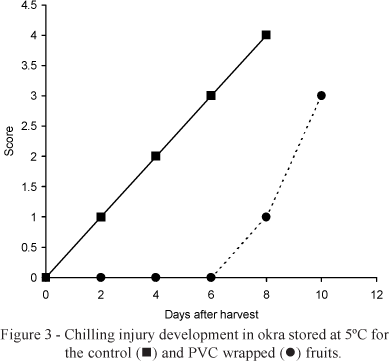Little information is available on the influence of temperature on plastic films wrapped okra (Albelmoschus esculentus) for their postharvested conservation. This works investigated the influence of the temperature and PVC film on the development of chilling injury and storability from one of the most popular Brazilian cultivar of okra cv. Amarelinho in fruits stored at 5, 10ºC and at 25ºC. Fruits were harvest at commercial maturity stage with length ranging from 8 to 12 cm, and immediately wrapped in PVC over a polystyrene tray and than stored until visible deterioration or wilting symptoms. Lowering the temperature of storage room from 25 to 10 or 5ºC decreased the weight loss in both PVC wrapped and control fruits, with a lower rate at 5ºC. By reducing the temperature to 5 or 10ºC and wrapping the fruits in PVC film, the relative water content of the fruit pericarp was maintained throughout the storage, while at 25ºC the high weight loss was associated with significant reduction of the water content. The development of chilling symptoms was delayed by the presence of PVC film in fruits stored at 5ºC. However, at 10ºC symptoms of pitting were not developed in PVC wrapped or control fruits up to tenth day of storage. The rate of chlorophyll degradation was diminished by reducing the temperature and by wrapping the fruits with PVC film. The appearance of severe chilling symptoms at 5ºC was associated to less chlorophyll in the fruit pericarp on the control as compared to their content in the PVC wrapped fruits.
Albelmoschus esculentus; chilling injury; PVC film; relative water content; chlorophyll





